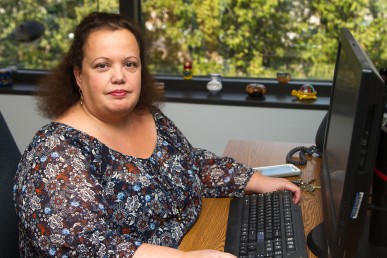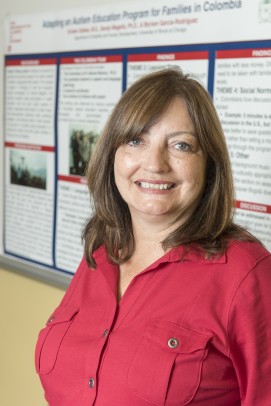East Meets West: Linking Latino parents to autism resources
For parents who have a child with autism, navigating the service system to find ways to help their child can be overwhelming.
Within the Latino community, promotoras — community health workers who are indigenous to the community — help educate parents on autism and appropriate services.
Two UIC researchers are going global by expanding a parent educational intervention designed for Latino parents in the U.S. to Colombia.
“There are disparities between Latino and white children in terms of access to services and treatments,” said Sandra Magaña, professor of disability and human development. “We want to bridge those disparities and use the community health worker to deliver the intervention and empower the parents.”
Magaña is collaborating with Marie Tejero Hughes, professor of special education, on the study, which examines the role of the promotora in the field of disability interventions. The study received a 2015 UIC Global Health and Wellbeing Seed Grant from the Center for Global Health.
The intervention, called Parents Take Action, helps parents understand what autism is — a developmental disability that is characterized by difficulties in communication, social interaction and repetitive behaviors — and how it affects their child’s development.
In the study, the community health workers in the U.S. are also parents of children with autism. These parents are trained and conduct home visits with Latino parents who have children with autism to share information.
Magaña and Hughes decided to expand the project globally after a professor from the Universidad Nacional de Colombia visited campus and told them that autism services were not as accessible to parents there.
“You have to have money to buy therapy there,” Magaña said. “If you don’t have resources, you don’t have access.”
“In Colombia, the infrastructure for special education is really not at the levels that they are here,” Hughes added. “There are laws to provide services and education, but implementing them has not gone to full fruition. Parents were really struggling to get information.”

Marie Tejero Hughes, professor of special education, is working with Latino families in Chicago and in Colombia for her research. — Photo: Vibhu Sreevatsa Rangavasan
UIC researchers have traveled to Colombia three times since January to train the promotoras, meet with families and visit schools. They provide families with evidence-based strategies to help reduce negative behaviors in children, such as providing laminated picture schedules so children with autism — who often are rigid in their routines — can see what will happen next in their day, Magaña said.
“Parents are becoming more empowered,” she said.
Hughes traveled to Colombia over the summer to meet the families in person.
“The families were wonderful to work with and happy about being involved. I was so impressed with the dedication to their kids and the adversity that they have to face navigating the school system,” she said.
“It really helped me to understand what we are learning from the research by seeing some of their reality.”
Before the intervention, parents reported keeping their children at home most of the time because they were afraid that their children would exhibit negative behaviors in public, Hughes said.
“Because they were learning some techniques for dealing with behaviors, they were now more comfortable going out in public,” she said.
The study also examines cultural preferences for information gathering, Hughes said. In Colombia, families traditionally want experts, such as physicians, to provide information to them, she said.
“There’s a lot of respect for professionals in South America and having other families be knowledge-givers is a newer idea,” she said.
Parents in Colombia have received training to deliver the intervention, but the researchers are also providing training to university students who are studying fields, such as occupational therapy, in which they likely will work with children who have autism, Hughes said.
“We want to see if having these professionals is another viable way of having impact with families,” she said.
“It’s really powerful to have another mother or father who has a child with autism talk with the families. But in Colombia, there might not be a large enough pool of parents right now who can take on the community health worker role.”
So far, parents have reported life-changing results from the researchers’ work.
“A lot of these families spent years not really knowing what is typical for kids with autism and what the possibilities are,” Hughes said.
“The intervention has opened their eyes to the possibility that there could be a bright future ahead. You could just see how eye-opening it was for them and how it really has changed their lives.”
For information, please email marieth@uic.edu

